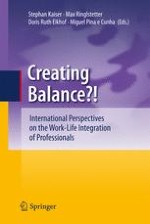2011 | OriginalPaper | Chapter
3. From ‘Balancers’ to ‘Integrators’? Young Professionals’ Talk About ‘Work’ and the Rest of ‘Life’ in the UK
What Does ‘Work-Life Balance’ (WLB) Mean to Today’s Generation of University Graduates and Future Professionals and What Support Do They Expect?
Authors : Uracha Chatrakul Na Ayudhya, Suzan Lewis
Published in: Creating Balance?
Publisher: Springer Berlin Heidelberg
Activate our intelligent search to find suitable subject content or patents.
Select sections of text to find matching patents with Artificial Intelligence. powered by
Select sections of text to find additional relevant content using AI-assisted search. powered by
